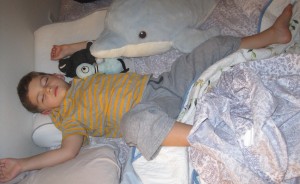I have two children. My daughter Hannah is 5 1/2, and my son Jacob is 2. While I like to believe that I’ve parented them in the same way, they are two very different little people. From their very first days, they have made their individuality clear.
I have found this very freeing, as a parent. It tells me that my children are their own people, and it is not my job to make them fit into a mold. I strive to teach them the things they need to know, and set reasonable limits. But when my daughter has a scream that could stop a train, or my son constantly runs from me in public, it is not necessarily a sign that I have failed entirely in my parental duty. They are simply expressing themselves in age-appropriate ways, based on their developmental stages and individual personalities.
And you know what? When they outgrow those stages, I miss them.
This struck me the other night, as I was awake at 4:00am (again) nursing Jacob back to sleep. I never remember how I got to his room, but I find myself there every night. My daughter Hannah was a champion sleeper from a very early age. I thought I had it figured out. But at almost 2 1/2, my son Jacob has slept through the night exactly three times. They have different sleep personalities, and I do my best to respond to them appropriately.

My children, just as they were for one instant out of their childhoods
Once Jacob drifted off, I shifted him and threw my arm around him. I felt the back of his soft little hand, and listened to his quiet breathing. It was warm and cozy and so peaceful. In the wee hours of the morning, it felt like the two of us were the only people awake, on that double bed in his bedroom. And I knew, I knew, that I would miss these moments one day.
Our children’s neediness can be hard to take. Sometimes, they need so very much of us that there isn’t anything left for our partners or ourselves. They wake us from sleep, they cling to us while we try to pee, they interrupt us while we talk on the phone, they cry because we brought them the wrong sippy cup. But in these moments, they are also perfectly expressing themselves as they are right now. Little people, who see the world in us, and reach out to us with total faith.
There is so much that is good in the midst of the chaos that is parenting young children. I strive to cling to that goodness. Little pieces of childhood, stolen moments between my child and myself. If I’ve learned anything in my 5 1/2 years of parenting it’s that these moments will be gone, and all too soon. And so I try to reach out and grasp them, even though I know I can’t. And sometimes, on a random Tuesday at 4:00am, I almost succeed.
What moments will you miss when they’re gone? What do you do to hold on to them while they last?



 Register for this call to hear hosts Lu Hanessian and Lysa Parker talk with Dr. McKenna about:
Register for this call to hear hosts Lu Hanessian and Lysa Parker talk with Dr. McKenna about: